Vienna Philharmonic mourns a legendary concertmaster
RIPThe death was announced this morning of Walter Barylli, concertmaster of the Vienna Philharmonic from 1939.
In 1945 he founded the Barylli Quartet with three orchestra colleagues, issuing a spate of Mozart, Beethoven and Schubert recordings. He left the orchestra in 1972.
Barylli, born in Vienna on June 16, 1921, was 100 years old.

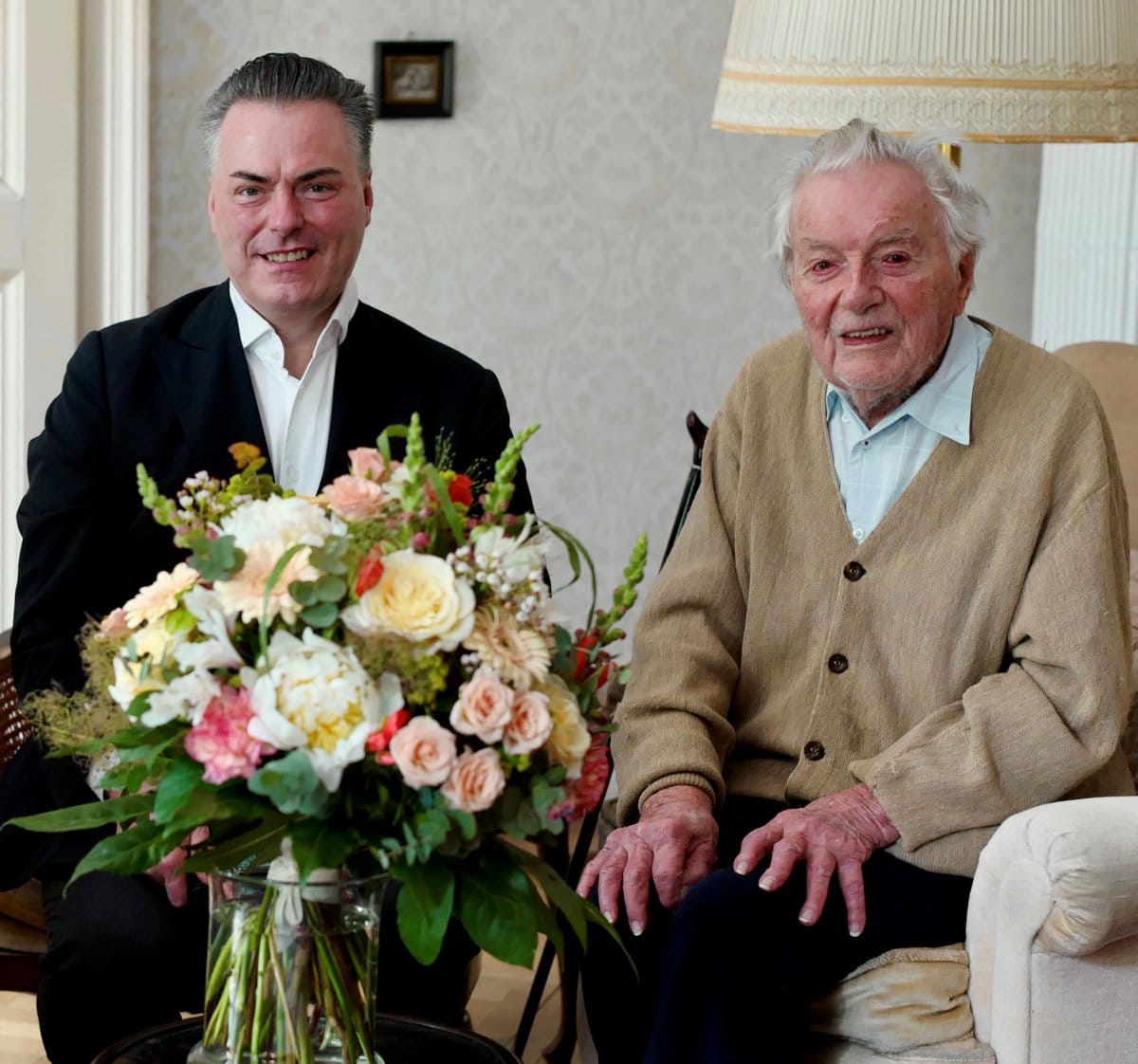
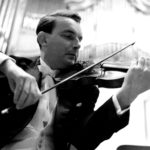

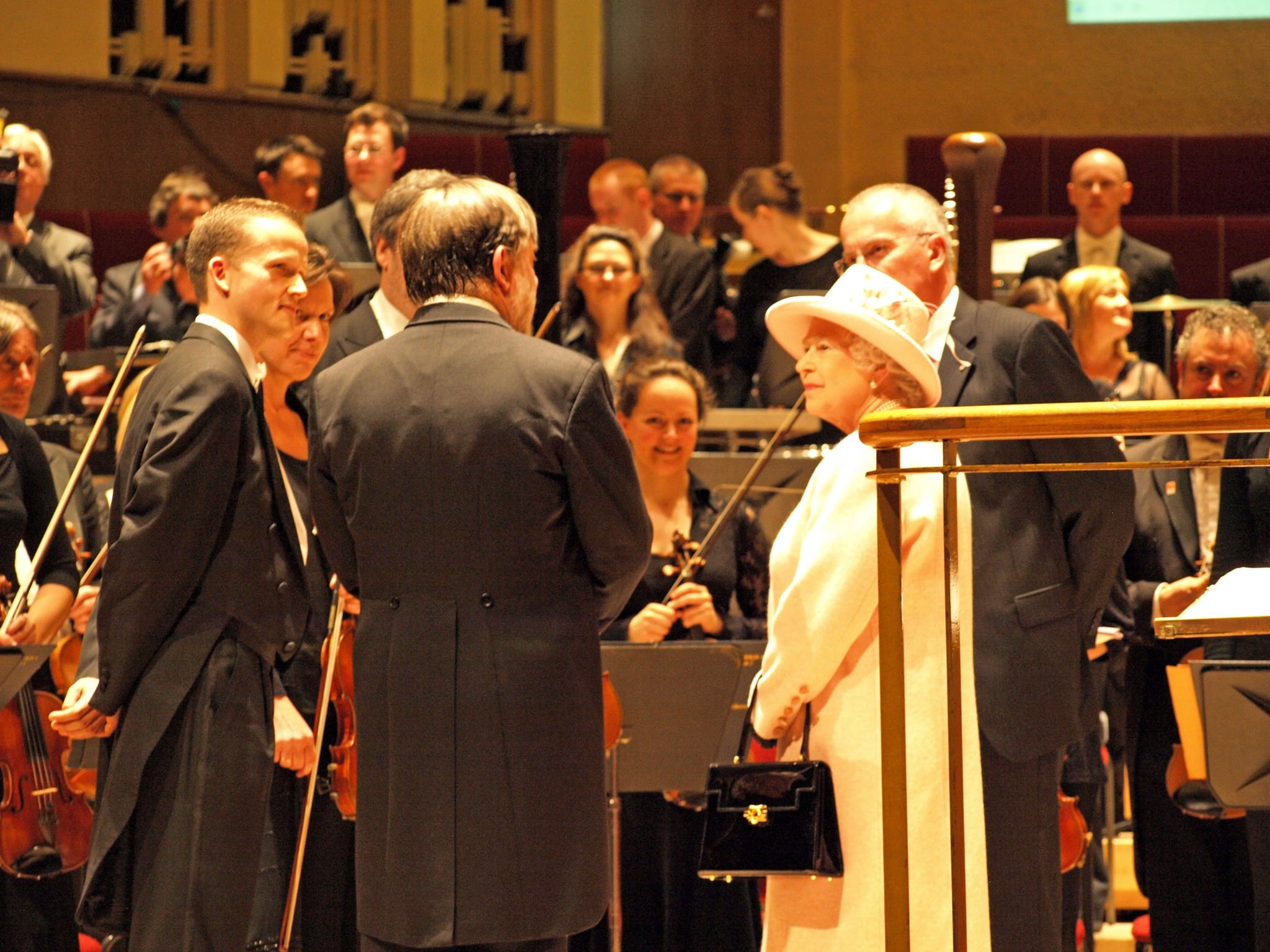
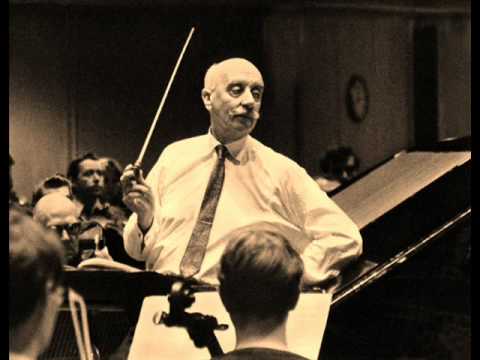
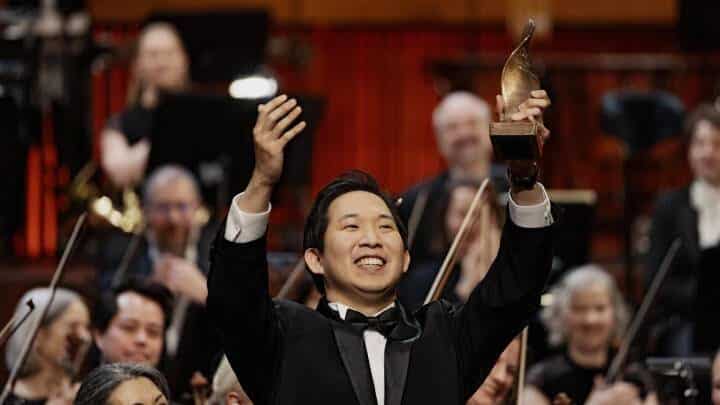
Mr. Barylli was a unique and great musician whose legacy to the VPO and to the world of chamber music could not be greater. More than that, he was a great gentleman, and a warm, sympathetic, encouraging teacher. Heartfelt condolences to his family and friends.
Das war ein großer Musiker aber Hetzel reichte noch an ihn heran und dann Küchl und jetzt Honeck. Das erste Pult in Wien bleibt in seinem Andenken.
Was he brought in to replace Arnold Rosé?
Or Julius Stw[e]rtka, the other concertmaster?
He played with the VPO from ’39 to ’72. Think of the stories and memories he must have had. Of all the great conductors, soloists and composers he must have known. If anyone should have written memoirs, it’s Barylli. RIP.
I have heard that he did
His memoirs were published in 2006 under the title
Walter Barylli
Ein Philharmoniker einmal anders
and contained a CD
The VPO was and is a great orchestra musically. Virtually every other aspect of their history during Mr. Barylli’s tenure is a stain on humanity. The legacy of racism and misogyny was real not just from 39-45 but well into the 70’s and 80’s. The anti-semitism experienced even by Bernstein was well documented; in virtually the same breath a principal player extolled his Schumann while dismissing the conductor’s compositions as Judische musik and referring to his ethnicity when complaining about a rehearsal that ran over the allotted time. I can do without his memoir of the VPO.
So do without. But don’t stand in the way of others who might find it interesting, even if they agree that the orchestra’s members were perhaps not always stellar human beings.
I have to confess that I don’t really know many ‘stellar’ human beings myself. Most of them are sadly flawed in some way, unlike myself!! I guess they’ve always found ‘stellar’ an impossible hurdle to encounter.
If only they’d lived today so that they could be cancelled because they weren’t up to snuff with the opinions of the bien pensant; the mirror opposites of those Nazis to whom you refer. Ideology without the pesky uniforms. But coercion nonetheless of a very unpleasant kind.
As always using Nazis analogies is toxic bordering on imbecilic. Among those countries that are governed by democratic institutions, whether right or left-leaning, I’m unaware of Nazis without uniforms in positions of authority. Perhaps you’d care to point out where mass murder and concentration camps are used in democratically-elected societies to maintain authority? The fact that you are threatened by societies that refuse to tolerate racism and marginalization of minority communities is regrettable but doesn’t equate with living under Nazism.
In 1946, the VPO invited Rosé back but he refused because there were still 50 Nazi party members in the orchestra. His daughter Alma died at Auschwitz in 1944 where she led the comp’s women’s orchestra.
. . . and Alma Rose’s mother was Gustav Mahler’s sister, Justine.
I believe the number was later determined to be 60. Indeed, Mr. Rose didn’t leave for a new position or due to voluntary retirement.
Im Verlag A. Barylli erschien im Jahr 2006 das Buch von Walter Barylli „Ein Philharmoniker einmal anders“.
Ich studierte mit seinem Lehrer und Onkel Carl Barylli vor vielen Jahren in Wien und lebe seit 40 Jahren in England.
Walter Barylli’s Cousin Ferdinand war ein Mitschüler und Freund.
Schöne Erinnerungen.
Mr. Barylli’s memoir is called “Ein Philharmoniker Einmal Anders.” It appeared in 2006. It tells the story of his life.
Mr. Barylli was born in Vienna on June 16, 1921. His parents met in 1914; his soldier father was passing through the Wien-Floridsdorf railway station on his way to the Russian front, and his mother was among the young women there who were pressing flowers and refreshments into the hands of the departing troops. It was a case of love at first sight. They kept in touch and married at war’s end in 1918.
Mr. Barylli’s first five years were spent in post-war poverty. His parents ran a little mom-and-pop grocery store in Vienna’s third district. During the hard times, their customers were often forced to buy food on credit, and his parents could not bring themselves to refuse a customer in need. The family lived in a storeroom that adjoined the store: no running water, heat from an old stove, no refrigeration, cooking on a small gas hotplate, petroleum lamps for light—he remembered there was one large cabinet for clothes, his parents’ bed, and a small bed for him in the corner. Every day, to prevent rickets, he had to swallow a spoonful of Norwegian cod liver oil—children’s aid from a foreign country.
When he was four, he began violin lessons (on a ¼-sized violin) with his Uncle Carl, at that time himself a music student. The next year, the family moved to a government-built apartment building that still stands at 149 Landstraßer Hauptstrasse. Heaven! he said. He began lessons with the VPO concertmaster Franz Mairecker. Then, from 1933, he studied with a rather odd American violinist, a known soloist and guest professor at the State Academy — Florizel von Reuter. Reuter took Barylli on for free on the condition that he would eventually get a percentage of the boy’s income. Barylli lived with Reuter in Munich, and studied with him daily for at least three years—until his parents got wind of Reuter’s passion for spiritualism and table-tipping, which freaked them out. Somehow, the contract was broken.
Mr. Barylli won the Fritz Kreisler Competition twice and was awarded the prize by Kreisler himself. By 1938, he was a recorded artist in the early stages of a soloist’s career when the German Anschluss of Austria took place. Traveling from Munich to Vienna, he saw the troops amassed on the Austrian border. Many of the Jewish musicians of the notoriously anti-Semitic Vienna Philharmonic were dismissed (and many murdered); consequently, there were openings in the VPO first violin section. Since Philharmonic members could avoid military service, Mr. Barylli auditioned, and became a “Philharmoniker” at age 17. The next year, he won the position of Concertmaster of the Vienna Philharmonic and State Opera Orchestra with Lalo’s Symphonie Espagnole and Strauss excerpts. Imagine what that meant for an 18-year-old! Imagine trying to establish your authority at that age: if he told his section to play up-bow there was sure to be an old man in the back who would say that Mahler had told them to play it down. Over the years, he would play for some of the greatest conductors: Strauss, Furtwängler, Mengelberg, Kappertsbusch, Walter—to Karajan and Bernstein… Because he began so young, and lived so long, he was a remarkable authority on the VPO—its history and traditions. I have often thought that a certain famous conductor who insists that orchestras did not play with vibrato in the 1930s had only to pick up the phone to learn that that was not true. Mr. Barylli’s vibrato was quite modern and beautiful—from the beginning.
During the war years, Mr. Barylli formed—together with Philharmonic colleagues—the famous Barylli Quartet. After the war and into the ‘50s, the quartet toured internationally, and made a series of remarkable recordings of Classical literature for Westminster—my first encounter with Mr. Barylli’s beautiful playing.
Mr. Barylli and Paul Doktor were good friends, and together made one of the finest recordings of Mozart’s Sinfonia Concertante for violin and viola. Mr. Doktor told me that they were astonished to discover they had matching Vuillaume instruments.
Mr. Barylli’s playing was unlike what one hears today: the sound exceptionally warm, with no sharp corners (as I like to think). Not lacking in virtuosity, certainly (!), but not at all aggressive. Intimate, conversational, approachable, humane. I have always imagined that it goes all the way back to the days of the Hungarian violinists in the time of Haydn, Mozart, Beethoven, and Schubert.
He retired from the VPO in the early ‘70s—he had a health issue with his bow arm. One time when he was older I walked with him arm-in-arm. That arm was completely stiff. I don’t know what happened. It must have been personally devastating for him—who was so preternaturally gifted and capable.
Near the end of WWII, American pilots bombed St. Stephen’s Cathedral, the opera house, and the Heinrichshof Building across the Ring from the opera, where Mr. Barylli lived with his future wife and their infant son. They were in the cellar at the time, and nearly killed. He and the other members of the Philharmonic lived together in a cellar in Vienna during the time the Russians invaded the city—supporting one another as well as they could, eating whatever was available, and trying to protect their wives from being raped. It’s a hair-raising story, which he set down in his diary at the time, and which is excerpted in his memoir. At that point, he was not married—the Nazi race laws forbade his relationship with his “non-Aryan” partner, Lillian Fayer, who became his wife after the war. Lillian Fayer was the heir and owner of the famous Atelier Fayer—the photographers who made the publicity portraits of all the Vienna opera stars and other musicians and artists.
I saw him last on the day after his 90th birthday. He had had a hip operation, but walked over from his lovely garden apartment at the Belvedere Palace to meet my wife and me for Apfelstrudel and coffee at the Café Imperial. As we sat, we read the notice of his birthday in the papers. I still remember my last glimpse of him, still elegant in his old age, leaning on his cane as he disappeared around the corner of the Bösendorferstraße.
Mr. Barylli was a warm and humane gentleman and an important musician. Though he began his life in poverty, he was rich in spirit and culture. My elderly Viennese landlady, who had seen the Kaiser, once talked with him on the telephone, and when she hung up she said to me he must be nobility—he spoke just like the Kaiser’s family. And, indeed, he was gracious, intelligent, kind. The world will remember him for his distinguished musical career, but I will remember him as an exceptional, caring, man whom I had the great good fortune to know and to study with at a critical period of my young life.
No doubt a wonderful musician. Name one action he took, given his position of authority, to change the VPO culture from what led to his appointment in 1939? It is my understanding that during the entire post-war period the VPO was always unduly concerned about the ethnicity of the conductors they engaged. Excluding Walter, who had converted, Kertesz was perhaps the only Jewish conductor that they engaged on a regular basis until Bernstein. As for non-Austrian men and woman the record is clear, neither need apply. Please spare me the argument that they are unfamiliar with our style of playing.
Interesting comments, but about vibrato– remember that Barylli was born after Heifetz had made his debut and first recordings. And he was 18 when he got a chance to put his imprint on Vienna’s sound. Arnold Rose’s quartet made several recordings, and they show a very 19c idea of technique and style. The Salzburg performance of Death & Transfiguration with Toscanini also gives a glimpse of that string sound.
https://vimeo.com/72034670?fbclid=IwAR2–4_2TnkDybeHUcgzwwTjbzTE3JdgLjnJcSdrZ312NRZAI-PoTokDrk4
1939, you say…hmm. Indeed a stained presence and a stained orchestra all the way around.
In 1939, Mr. Barylli was 18 years old; he had the choice of being Concertmaster of the Vienna Philharmonic Orchestra or being sent to the Russian front. Seems like a no-brainer choice to me.
First, the war with Russia didn’t begin until June 1941 so there was no Russian front in 1939. Second, the reason the position in the VPO was open was clear by 1939 so an extraordinarily talented musician might have thought twice before deciding he had no qualms about joining. Third, I would be willing to bet he had other options with 1st rate orchestras. Then again if he chose not to join there was a good chance he’d never be invited back. To anyone with those choices seems like a no-brainer but he opted for the easiest option. The question(s) is why?
Did you know him, Amos?
You claim to be an expert on the man yet you are unable or unwilling to address any of my questions regarding the sordid period when he was in a position of authority.
Truly sad to see someone who made something beautiful with his hands stuck with gnarled arthritic fingers in old age.